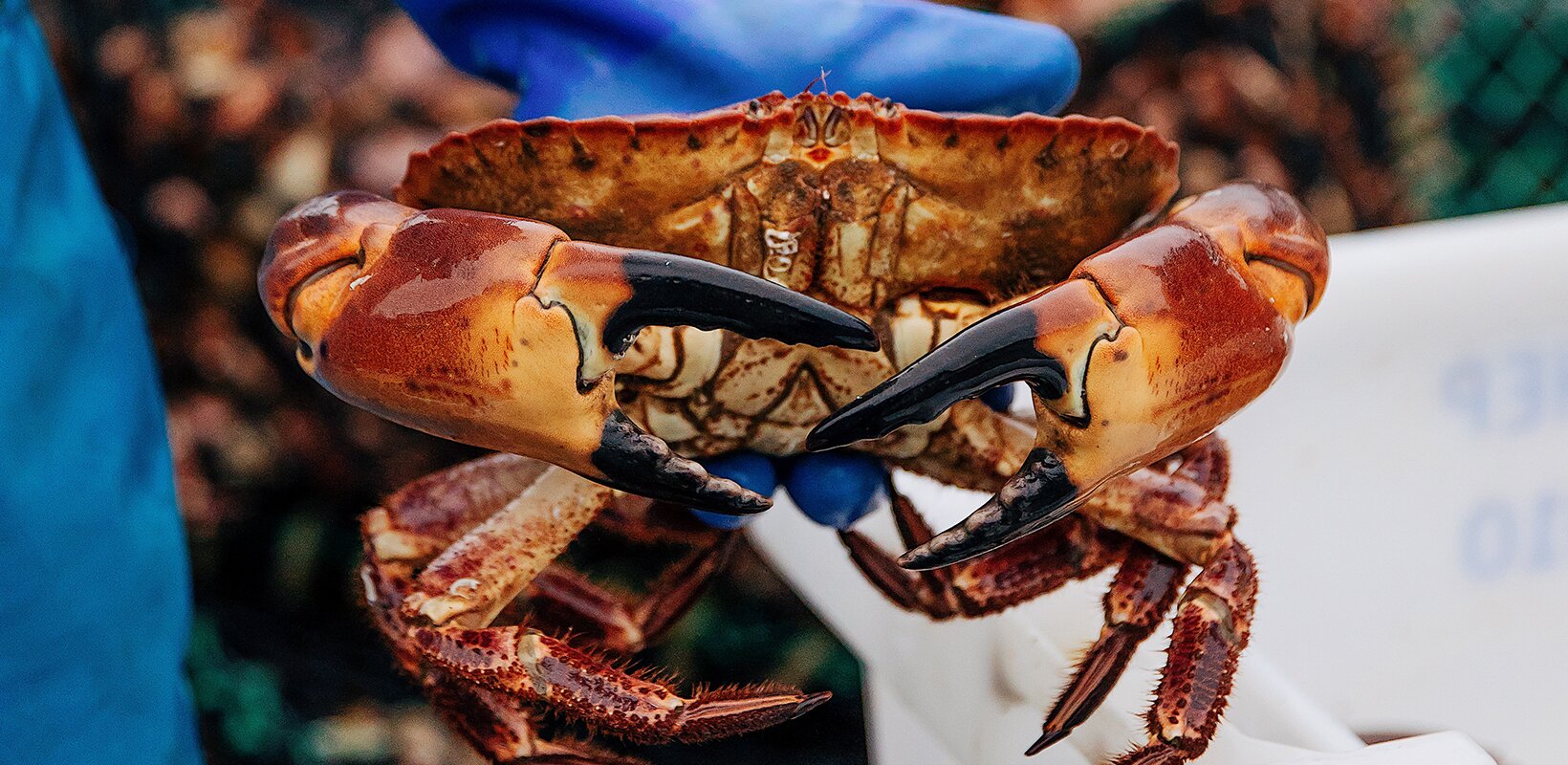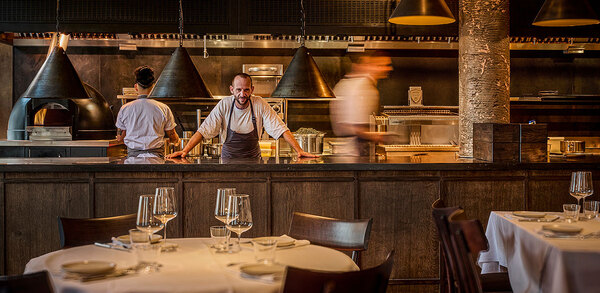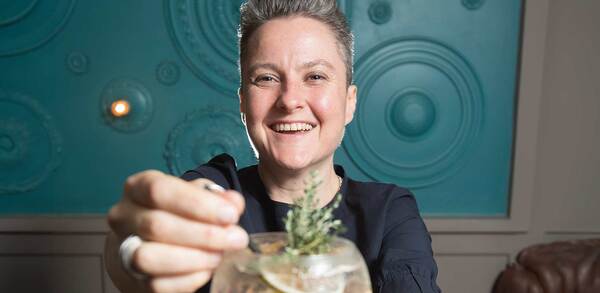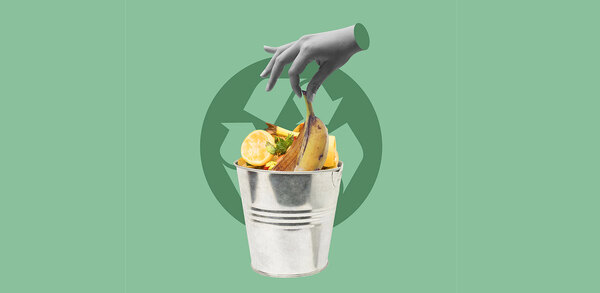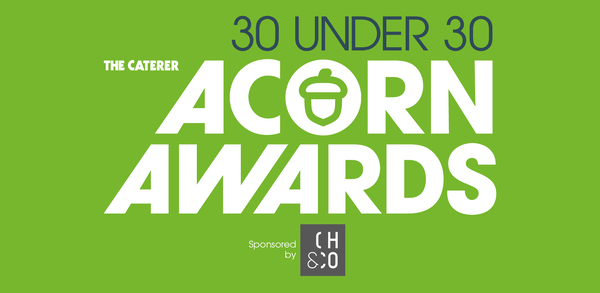A brill idea: how to link sustainability with inventive seafood cookery
Sustainability is paramount when serving fish and seafood, so why not make it work to your advantage and introduce unusual species and dishes? Will Hawkes reports
He might be the godfather of modern British seafood cooking, but even Rick Stein is not immune to criticism. When Rick Stein Restaurants’ Instagram account revealed in November that his Padstow flagship restaurant had bought and served a 150kg bluefin tuna, a species that has recently returned to British waters, online criticism began almost immediately and the articles followed (‘Rick Stein roasted by conservationists’, insisted the Daily Mail).
The message was clear: sustainability matters, and perhaps more in the world of seafood than anywhere else – even when, as in this case, the fish has been landed legally and in line with sustainability quotas.
Consumers are increasingly aware of the pressure on seafood stocks, which is increasing all the time. Laura Taylor, buyer at food and drink supplier Allmanhall, says: “Global fish consumption has doubled since 1998 and is projected to nearly double again by 2050. According to the WWF a third of our planet’s fisheries have been pushed ‘beyond their biological limits’, meaning that fish are [being] caught at an unhealthy rate.”
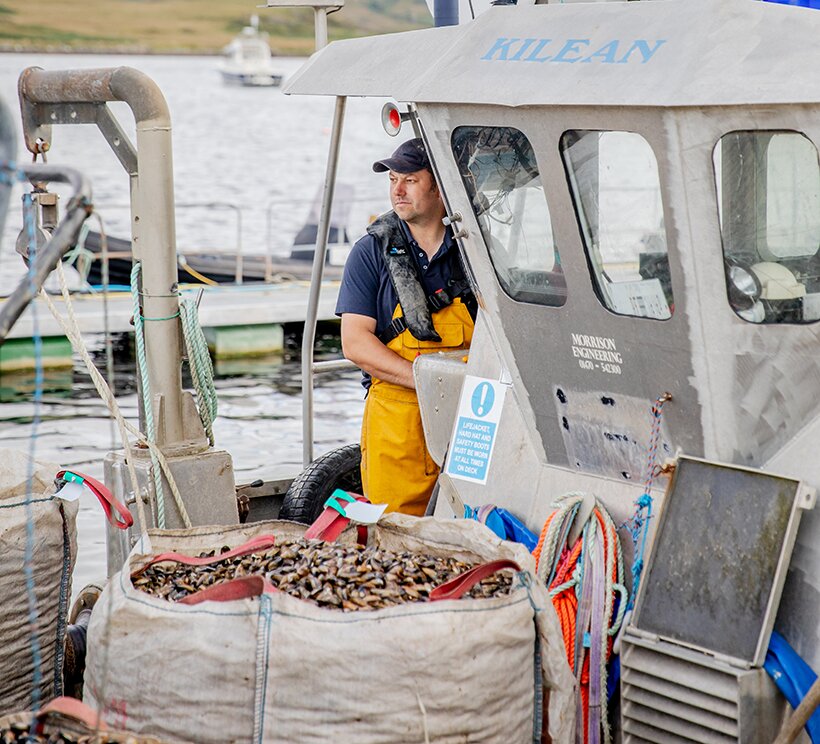
Faber and flavour
Given this environment, how can operators serve fish and ensure they don’t fall foul of public opinion? It’s possible – as Faber, a new restaurant in Hammersmith in London, demonstrates. This smart, modern site is leading a new generation of fish restaurants where sustainability and seasonality walk hand-in-hand with high-quality cooking.
Like most good ideas, Faber started in a pub. Co-owner Anthony Pender runs the Yummy Pub Co, and a fish-heavy menu with everything from mussels and squid ink risotto to grilled octopus is served at one of its venues, the Victoria in Mile End, London. It’s a successful blend, but Pender wanted to take it further, not least because the pub is tied, meaning he doesn’t have freedom of supply.
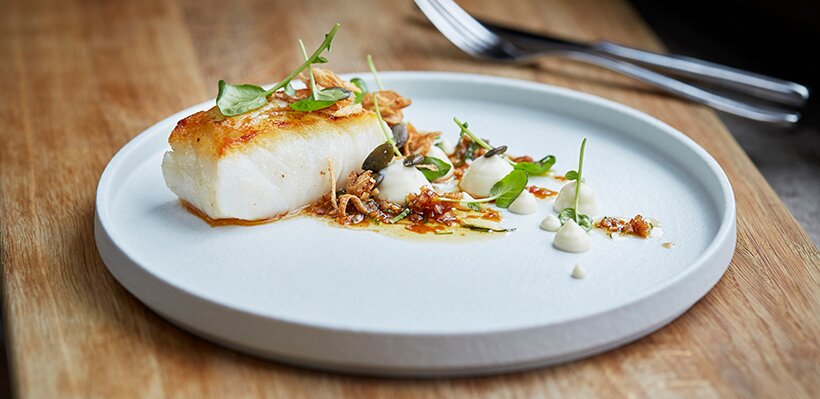
“We wanted to break away from the pub clichés: fish and chips and burgers,” he says. “But at the same time the restaurant is airy and welcoming and we wanted it to be as accessible as possible. It’s not super-premium, you can come in and spend £15 or you can spend £150.” The menu varies depending on the time of year, taking in everything from crowd-pleasers like sea bass and mussels to John Dory, brill and whole monkfish tails.
The site in Hammersmith, where Villagio, an Italian restaurant, was until recently, emerged last year. “An agent called me and said you might like this site, and the neighbourhood seems a bit of a black hole for restaurants,” says Pender – and the reception so far has been good.
The concept is based upon sustainability, he says: “I don’t think that people understand how sustainable a fish restaurant can be. We’re all about what’s coming off the day boats, we’ve become really fanatical about it. We’re very into seasonality. Take sea bass – until recently it was our best-seller, but it’s out of season now so it’s off the menu.”
Customers can be surprisingly understanding. “It’s important to sell it to guests so they understand,” says Pender. “Sometimes we have limited options because, if there’s a storm the boats haven’t been able to go out because it’s dangerous for the fishermen and the fish don’t like it so they swim lower. But I think guests understand and even like it – they enjoy that education as part of the experience.” It affects recruitment, too, he says: people want to work for Faber because they’re keen to join a sustainable business.
cater.affino.com/AfcTemp/MediaImport240424/wtpi214961)" alt="Scottish langoustines" />
The open-mindedness extends to seaweed, which is used at Faber in a variety of ways. There’s dulse, smokey and red, used in salads; kelp, used in pumpkin gnocchi; sea lettuce, a light green leaf used in salads for its light and refreshing briny notes; and laver, with its rich flavour, used to create a spread or condiments. All of it is produced at Câr-Y-Môr, a community-owned business in Haverfordwest in Wales.
Pender has also been surprised by how keen guests have been to order more expensive or uncommon options, such as lobster, in preference to the value-option, the ‘Daily worker’s lunch’, a £20 special served with a drink. “People are willing to spend on something different,” he says. The model means that what’s most popular can change every week, in stark contrast to the pub.
There are plans for further Fabers, although not in the immediate future. “What we’re not going to do is head for coastal towns,” he says. “We think what we do is replicating what a lot of restaurants in those places are already doing, so we’re bringing it inland, to places that don’t have enough good fish at affordable prices. We want to open a few more in London over the next few years.”
Norwegian good
Sustainability is not just a local obsession. For Seafood From Norway, it’s a crucial part of the nation’s sea-fishing infrastructure. Victoria Braathen, UK director at the Norwegian Seafood Council, explains: “As a major seafood nation, Norway understands its responsibility to help drive the global sustainability agenda. Norway holds sustainability at its heart, from pioneering stock management to diverse fishing fleets.”
A key part of this is the migratory skrei, which hails from the world’s largest cod stock and, says the Norwegian Seafood Council, is one of the most sustainable fish species. “Having gained recognition for its firm texture, lean flesh and rich flavour, skrei stands as a premium seafood choice that elevates any culinary experience, providing a versatile canvas to create memorable dishes,” adds Braathen.
For Direct Seafoods, sustainability is essential: customers demand it. Director of sales Natalie Hudd details: “Fish welfare is paramount to our sourcing at Direct Seafoods; it’s the reason why we seek out farmed fish certified by organisations such as the Aquaculture Stewardship Council, Global GAP and Best Aquaculture Practices.”
She advises operators to insist on sustainable options. “We like to work through menus with operators, coding their fish and seafood with the relevant Marine Conservation Society rating, and then calculating the proportion of their purchases that fall within each rating,” she says. “This enables us to identify the least sustainable species and offer better alternatives.”
In terms of equipment, Rational offers the iVario advanced bratt pan and iCombi Pro combi-steamer, which can be used to create a variety of seafood dishes by searing, poaching, pan frying, deep frying, boiling and sous-vide.
Haluna Choudhury, marketing coordinator, says: “When it comes to cooking shellfish to perfection, the Rational iVario Pro is the perfect choice. With its ability to cook a variety of ingredients simultaneously, the iVario Pro’s versatility and precision make it an invaluable tool for chefs who want to unlock the full potential of shellfish cuisines.”
Flavour is, of course, crucial when it comes to hospitality, but it’s clearly not the only factor. In the world of seafood, sustainability is here to stay. Reflecting on that bluefin tuna, Pender is clear: “We made a conscious decision that if we were offered it, we would say no,” he says. It’s the sort of decision that increasingly makes, not just ethical, but commercial sense too.
Seafood from Scotland
Scotland is known around the world for the quality of its food and drink, from beef to whisky, but in Angus and Islay, its greatest product may be found in the water along its coastline and in its freshwater lochs.
This is where some of the world’s finest shellfish is produced. Shellfish is a key part of Scotland’s seafood industry: according to the Scottish Sea Fisheries Statistics report produced by the Scottish government in 2022, langoustines accounted for 13% of the Scottish seafood industry’s total value, with other shellfish contributing a further 15%. Indeed, Scotland is the home of langoustines: in 2022 18,000 tonnes were landed by trawlers, while a further 1,415 tonnes were creeled (caught using a basket).
As you might expect, there’s a host of companies producing high-quality shellfish. Keltic Seafare, based in Dingwall, offers hand-dived scallops, creel-caught langoustines, Wester Ross oysters and blue lobster, while Tarbert’s Loch Fyne Seafarms sends scallops, live langoustines, lobster and brown crab to the seafood-loving markets of Singapore, Hong Kong and the UAE. Loch Fyne Oysters, meanwhile, hand-rears its oysters near Inverary and farms mussels in the Outer Hebrides. The latter were selected as part of the central platter for the 2023 grand final of Bocuse d’Or.
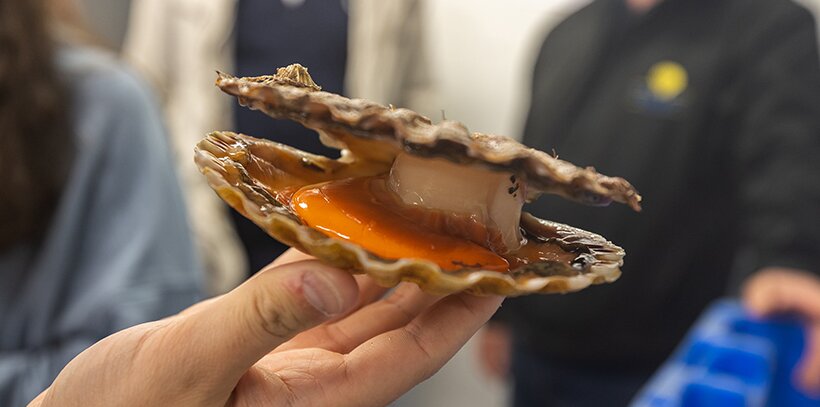
Adam Wing, Seafood Scotland’s head of trade marketing for the UK, Middle East and Asia, says: “Scotland is home to an incredibly diverse range of shellfish species. Whether fished traditionally by creel, hand-gathered, cultivated, rope-grown or hand-dived, our waters host some of the freshest and finest shellfish products in the world.
“Our cold, clear waters play a significant role in contributing to a fresher, more delicate flavour. Despite the economic challenges and sustainability demands that face the sector, these dedicated producers continue to champion the value of Scottish provenance and provide top-tier products across the entire supply chain.”
Suppliers
Allmanhall allmanhall.co.uk
Câr y Môr www.carymor.wales
Direct Seafoods www.directseafoods.co.uk
Faber faberrestaurants.co.uk
Keltic Seafare kelticseafare.com
Loch Fyne Oysters www.lochfyne.com
Loch Fyne Seafarms www.facebook.com/lochfyneseafarms
Rational www.rational-online.com
Seafood From Norway fromnorway.com
Seafood Scotland www.seafoodscotland.org/



